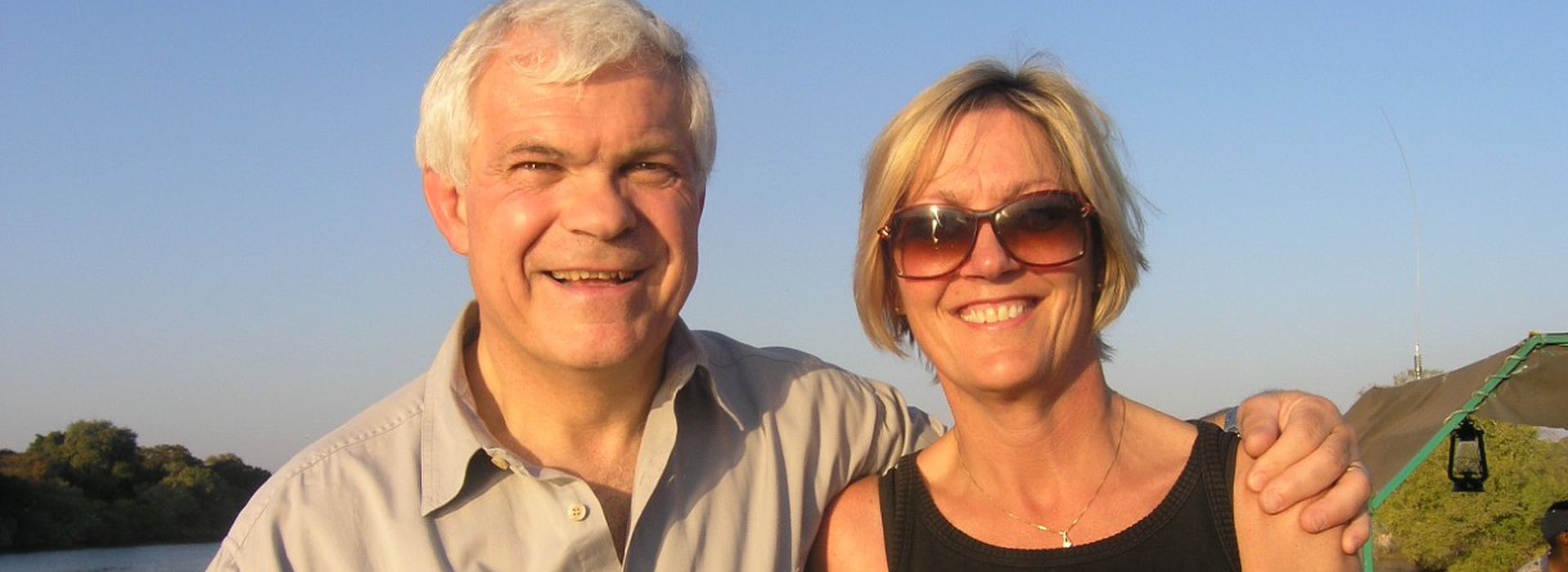Thursday 07 May 2020
Maggie's Newcastle

My wife and I both found comfort and support at Maggie's, and since her death, I can't imagine doing it without Maggie's.
My wife Lynne was diagnosed with oesophageal cancer in June 2016 when she was only 63. I was a GP and Lynne was a nurse, a brilliant nurse in so many ways. However, our 40 years of nursing, general practice and talking to people and patients who have cancer didn’t prepare us emotionally for being on the other side of the fence, as we now were.
Life had become very different and frightening for us.
Lynne opted for radical chemo-radiotherapy rather than surgery, in the hope of a faster recovery. An operation may have damaged her larynx as well, and Lynne didn't like the idea of not being able to speak.
The 12 weeks of chemo-radiotherapy that started in July 2016 was arduous with lots of side effects, particularly severe nausea and vomiting.
In October 2016 Lynne was so unwell that she was admitted for over three weeks and was discharged with a nasogastric feeding tube in place.
Fortunately, Lynne was able to have the tube removed a week before Christmas.
Despite the treatment, in July 2017 scans showed that the cancer had spread to her left lung and lymph nodes, producing severe pain in her left arm and shoulder. The lung tumour was removed, and Lynne had more chemotherapy and radiotherapy to her spine in the hope of reducing the pain.
Throughout her life Lynne helped others and was a family girl. A great regret was knowing that she would not see our six grandchildren grow up, and our own children continue to thrive.
It was early in Lynne’s illness when we first came to Maggie’s. It immediately felt to Lynne like a place to escape, a refuge with a feeling of normality rather than being surrounded by the hospital and cancer.
As a doctor and a nurse we didn’t particularly need medical information from the Maggie’s staff, but rather we were looking for emotional support for the very frightening situation we found ourselves in.
When Lynne was an in-patient, we were able to leave a note on her bed saying where we were, and escape to Maggie’s, sometimes with her drip and drip stand in tow.
We would come down here where it was calm and quiet.
The people we met were lovely and welcoming, usually sitting around the kitchen table.
Talking with other patients, the relatives, the staff and volunteers cheered us up. Someone always seemed to be laughing, despite their problems.
Lynne died on Ward 35 in November 2018. It was a Tuesday, just two months after her 65th birthday.
She was an in-patient at the time. We had been at Maggie’s having a cup of Earl Grey tea that afternoon with Eve and Sally, two of the volunteers. We returned to the ward and at 6 o'clock, Lynne suddenly collapsed and remained deeply unconscious. She died at about five to midnight with me at her bedside, holding her hand.
At times, I still can't believe that she's gone.
The six-week bereavement support course and the monthly drop-in sessions at Maggie’s became very important to me after Lynne died.
Our initial group of seven seemed to gel very quickly, and we were all able to talk quite freely about our feelings and emotions.
It worked very well being able to talk openly to people who were going through the same sort of feelings as I was.
I think with the people here you can usually open up more easily than you can even with your very close family.
Having Krystyna, Maggie’s Clinical Psychologist, as our mentor was invaluable.
The conversation never seemed to flag. I will always remember her reassurances that “tears are normal and tissues always on hand”, but more importantly that “the loss of a deep, deep love results in an equally deep, deep sadness".
Our group soon discovered that there isn't a right and a wrong way to grieve.
What’s right for one person can be absolutely wrong for someone else.
For example, I've filled our house with photographs of Lynne, and her clothes are still as they were, but someone else in the group has avoided photos and found packing clothes into boxes was the right way for them.
We also discovered that tears are normal at any time, and that anything you are experiencing as part of your grieving is normal for you. There isn't a wrong way of coping.
I also went on the Mindfulness course for six weeks. I wasn't sure whether that was going to be helpful for me because I'm a bit of a down to earth northerner, but I found it helped, and I’m still going to the drop-in sessions.
It would have been extremely difficult to cope over the two and a half years of Lynne’s illness and her final days in November 2018, without the comfort and support we both found at Maggie's.
It's something that I've found invaluable since being on my own, and I can't imagine doing without Maggie’s in the months ahead.
Finding out someone close to you has cancer changes your life, and we're here from that moment.
We provide free cancer support and information, visit our online community or get in touch by phone or email with a centre near you.
To find your nearest Maggie's centre, enter your postcode or town below.
Stay up to date with our news and fundraising by signing up for our newsletter.
Sign up